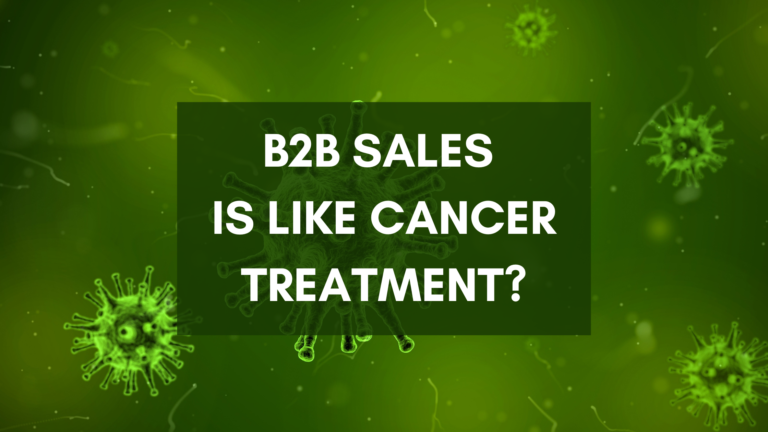Why B2B Pharma Sales Should Function Like Immunotherapy?

Let’s face it: selling will never go back to the way it was.
If you’re a sales manager in the pharma industry, you’ll probably have experienced this first-hand. Clinics and hospitals now impose greater restrictions due to safe distancing measures.
While some people may believe face-to-face selling will return, a new culture and accepted norm has already set in. We can still meet HCPs in-person, but the majority of decision making will be done online.
For us in the sales industry, there has probably never been such a huge shift in selling practices ever before. Trying to build rapport over a screen? There’s only so much you can do to create emotional connection.
But today, I’m not here to tell you the importance of virtual selling. The statistics prove that virtual selling is going to be the future. Research done by Bain & Company shows us this:
- “About 60% of surgeons believe that restrictions on in-person sales representative access are likely to persist even after a Covid-19 vaccine is available.
- Of the 75% of physicians who preferred in-person visits from medtech representatives prior to Covid-19, 47% now prefer virtual exchanges or less-frequent visits.
- Many physicians once skeptical of virtual interactions with sales reps now report these exchanges are high quality.”
Based on the above, you know the new norm is already here. And they are likely to persist in 2021.
Therefore, what we need to discuss is how to improve virtual selling so that sales targets can be restored to pre-COVID levels (or even exceeded).
For that reason, I’d like to borrow an analogy from oncology to show you why this new approach to virtual selling is far more effective.
Using Cancer Treatment As A Sales Analogy
Now I’m not a doctor, so I’ll keep this explanation as simple as possible.
Put in layman terms, cancer is a medical condition where certain cells in the body start dividing uncontrollably. This can lead to tumours forming in various organs of the human body.
There are two possible ways to treat cancer: chemotherapy and immunotherapy. We won’t talk about the others because they will not further our understanding of virtual sales.
Let’s now return to the two possible methods of treatment.
Chemotherapy is a “treatment with drugs that kill cancer cells directly. Chemotherapy attacks all rapidly-dividing cells within the body, effectively targeting fast-growing tumors.”
On the other hand, immunotherapy aims to strengthen the patient’s immune system to fight against the disease. This is achieved through enabling the immune system to “recognize, target, and eliminate cancer cells throughout the body.”
Which is the more effective approach?
Some conclude that immunotherapy is more effective because it can provide long-term protection against cancer. This is achieved because the immune system is now able to detect cancer cells.
However, chemotherapy relies on drugs to eliminate cancer cells. Hence, the body becomes reliant on the drugs in its fight against cancer. Once the treatment is not administered, the cancer cells start spreading again.
But before this becomes a medical debate…let’s go back to our topic of virtual selling.
Condensing the discussion above to its key points, there are two possible ways to treat cancer. The first is to destroy the cancer cells, and the second is to strengthen the body to destroy the cancer cells.
If you think about it, aren’t those the two ways we can hit our sales targets in this new normal as well?
This is how it’s similar: our sales teams are “under attack” because of COVID. A failure to adjust to virtual selling causes sales KPIs to be missed, which can directly affect the revenues of the companies we’re in as well.
2 Different Perspectives On Virtual Selling
Sales managers generally respond in two directions:
The first direction is to try and fight back against this new way of selling. To adopt an aggressive approach to destroy all objections and obstacles, just like how chemotherapy kills both cancerous and non-cancerous cells.
We pressure our sales teams to hit KPIs and play the numbers game - but meeting more prospects doesn’t change much if they can’t close deals.
However, the second direction is to focus on empowering our sales teams to thrive in a new selling environment. By strengthening their ability to recognise, target and close the right accounts, your sales team is able to create a significant difference in bottom-line revenue.
Just like how immunotherapy creates a long-term change in the human body, the right support can empower a sales team into peak performance in today’s uncertain business environment.
In fact, this principle is closely followed in my ADÆPT Sales System.
How Can Pharma Sales Teams Thrive In 2021?
If you’ve ever considered levelling up your sales team, it’ll be good to know what is typically taught.
Most “sales tips” in a virtual selling environment aren’t related to sales. Instead, they’ll tell you how you need proper lighting, a good webcam and a clear audio system.
Those factors are needed for a good first impression, but buyers have come to expect that. Looking professional in a virtual environment is just the start of clinching a deal. Yet, some salespeople mistakenly think that’s the only adjustment they need to make.
Well, that’s assuming their prospect even shows up for the appointment. Most prospects are simply unwilling to meet sales representatives because of the new normal we’re in.
Selling in a virtual environment is first and foremost about SELLING. It’s not simply about looking good on camera - non-profit organisations like Toastmasters will teach you that well.
However, if you’re looking to generate substantial profits for your company, virtual selling requires salespeople to adapt their methods of prospecting and closing into the online medium. It does not entail using old practices in the same way.
To thrive in a post-pandemic world, you’ve got to adapt before you can become adept.
